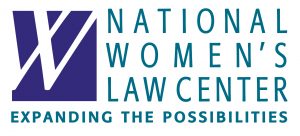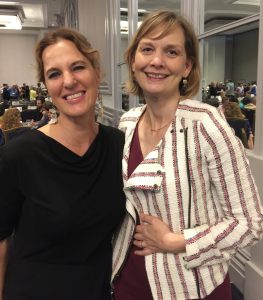Our attorneys recently attended the National Employment Lawyers Association (NELA) annual conference in Chicago. This year’s conference featured breakout sessions on “#MeToo: Hot Topics and Emerging Trends in Harassment Legislation,” “Don’t Be Afraid to Lose,” and the indispensable “Year in Review: Significant Developments in Employment Law.”
One of the panelists for the “#MeToo: Hot Topics and Emerging Trends in Harassment Legislation” discussion was the dynamic Emily Martin, General Counsel and Vice President for Education for the National Women’s Law Center. I sat down with her for an informal discussion on her incredible career, what drives her, the important work at the NWLC and what still needs to be changed to affect workplace harassment.
Noble: Emily Martin, can you give us a brief background on your career and how you ended up at the Women’s Law Center?
Martin: I am really lucky in that I am the one percent of attorneys who went to law school saying, “this is what I am going to do and I ended up getting to do that thing.” I went to law school with the thought that I wanted to do women’s advocacy and I wanted to do impact work and basically, that is what I have done. I was a fellow with the National Women’s Law Center and then I was at the ACLU with the Women’s Rights Project for about eight years or so, where I mostly did litigation on the range of issues including employment, education, and accommodation issues. In 2009, it was the beginning of the Obama administration, so I went to D.C to be part of that exciting moment. I was ready for
a shift out of litigation into something else.
I’ve been at the National Women’s Center since then. I have been doing mostly, but not only, policy work on different sets of issues, but much of my time has been spent on workplace issues for women such as pregnancy discrimination and unequal pay. In the last year, there has been a lot of harassment work including building our legal network for gender equity and implementing systems that make the TIME’S UP Legal Defense Fund work.
Noble: Is the TIME’S UP Legal Defense Fund one a kind?
Martin: It is certainly at this scope and size. We are aware of some very small funds that provide some support for costs on the plaintiff’s side, usually on impact cases, but the availability of fee support as well as costs at this scale, and without it being a profit-making venture, is pretty unique.
Noble: It is remarkable, particularly in these times.
Martin: For people in organizations like mine, one of those silver linings of tough times is the development opportunity. There is a lot of work that needs to be done, but at least there is also some real commitment from people and funding to help make that happen.
Noble: What do most people not know about the Women’s Law Center?
Martin: If you are not in D.C. most people probably don’t know us period! We have been around for more than forty-five years, and for much of our time we have been a very D.C.-based and focused organization and most of our policy work historically has been federally focused. Over the past few years, we have definitely been more purposefully engaging in state policy work across the country, making investments in making sure we have the staff and the ability to do that work and build those coalitions and relationships in a meaningful way.
Noble: What are some of the accomplishments of The National Women’s Law Center you are most proud of?
Martin: The National Women’s Law Center has been around a long time. It has been engaged in work on The Pregnancy Discrimination Act of 1978, the Civil Rights Act of 1991, and the Davis case where the Supreme Court held that damages are available for student on student sexual harassment under Title IX. There have been a lot of successes over The National Women’s Law Center career.
Noble: What are you most proud of about your work at The National Women’s Law Center?
Martin: During my time here, I have been most of proud of having been part of the issue of pregnancy accommodation and ensuring that employers provide the same sort of accommodations that are needed for pregnancy that they provide if accommodation is needed for disability. I am especially proud that this work has led to success not just in blue states, but in red states as well. South Carolina just passed a pregnancy accommodation law that we were deeply involved in drafting. West Virginia and North Dakota passed pregnancy accommodation laws and these states have been part of the new wave of law-making around this issue. That has been really affirming to see progress in a variety of different places bringing together people from a lot of different ideologies. And, obviously, the TIME’S UP Legal Defense Fund is a big moment for the National Women’s Law Center. It is a $22 million initiative, which really gives the opportunity to make sexual harassment law better, as well as making representation available for women, and possibly men, who would not otherwise have been able to have attorneys.
Noble: What are your particular challenges now at the Women’s Law Center?
Martin: Well, you know it is a challenging federal policy environment. Congress is hard. The administration is hard and the Supreme Court is also difficult. I think the challenges are finding ways to build progress in the face of a lot of deeply polarized oppositions. Whether that is with states, including states that are not necessarily progressive, but where maybe there is not the same deep distrust and dysfunction as at the federal level. Whether it is trying to create new relationships with corporate leaders, where there are corporate voices saying, “We think this is what we need to do and we are going to do it,” it is building the seeds for longer-term progress. We are doing work now with some of our champions in Congress to help craft the next generation of sexual harassment laws. It is going to be the model that many states hold themselves to. It is going to be the thing that people can organize around. And, in the long term, I believe it is going to be a legislative change that will happen.
Noble: Who are you working with on that?
Martin: Well, it is still underway. There are definitely a variety of senators and house members who are really committed to using this moment to make sure that the goals that we are pushing for are goals that will really make a difference.
Part two of our discussion with Emily Martin will appear next week online. – LN
About The Noble Law Firm
The Noble Law is a women-owned employment law firm with offices in North Carolina and South Carolina, founded by Laura Noble in 2009. Specializing in wrongful termination, workplace harassment, workplace retaliation, workplace mediation, and neutral third-party investigations, the firm is committed to leveling the playing field for employees. Their focus is on delivering positive outcomes with empathy and integrity, while also driving societal change in employment law.
The firm emphasizes diversity, collaboration, and innovation, fostering a balanced work environment that values the personal lives of its staff. With a strong commitment to technology and efficiency, The Noble Law provides personalized attention to a select group of clients, handling cases involving harassment, discrimination, retaliation, and more. The team’s extensive litigation experience allows them to deliver thorough and assertive representation.





